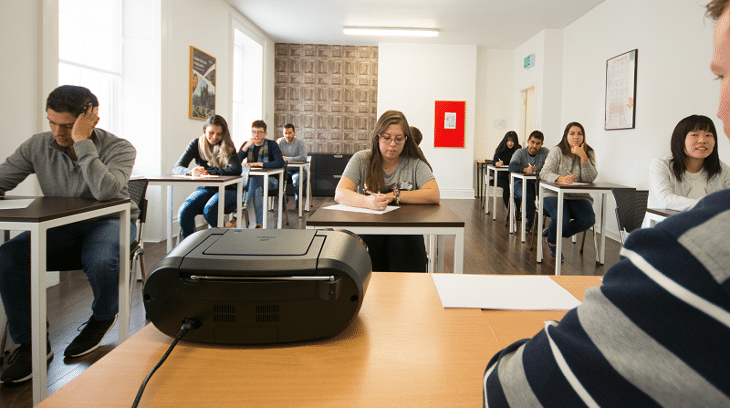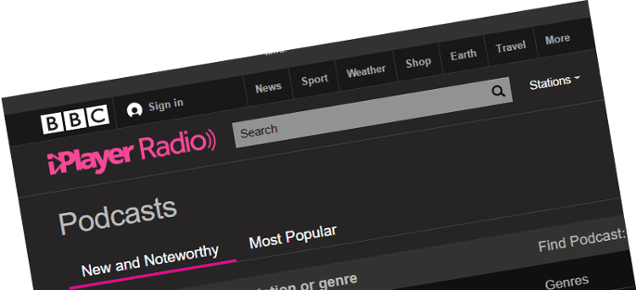IELTS Listening: How to Improve your Listening
Some students think that if you keep doing Cambridge IELTS past papers, you will improve your listening score. But this is not usually the way it works. It’s not that straightforward. You will need to develop the correct techniques alongside building your ability to recognise certain vocabulary and grammar.
Here at Atlas, we teach our students the techniques and language to help them get the grades they need to get good marks in the exam. Here are a few of the tips we provide our students.

1. Listen for Pleasure
One way to develop these general listening away from a strict exam focus is to listen for pleasure. Try to find things you like listening to, whether it be movies, football matches, the radio or even podcasts. The most important thing is that you listen to something you enjoy and not something that is of little interest to you.
Podcasts are a great way to find something you’re interested in as they cover a wide range of subjects. There are even ones that are graded to suit different English language levels. Here is a website that has a lot of podcasts just for English language learners:
http://www.fluentu.com/english/blog/esl-english-podcasts/
We also recommend that you listen to podcasts that focus more on science or academic topics. It’s these topics that you are more likely to encounter in the IELTS exam. Here are some of the best podcasts that focus more on scientific topics.
1) http://www.bbc.co.uk/podcasts/genre/scienceandnature
This BBC podcast has a wide variety of podcasts. The accents are mostly British which will help you for the exam.
2) http://www.radiolab.org/series/podcasts/
This American podcast covers an array of topics from science to philosophy. You will encounter a wide variety of american accents which will, again, improve your listening ability.
3) http://www.thisamericanlife.org/podcast
One of the first podcasts to become famous around the world, This American Life tells a variety of stories about American culture and the world around it.
One thing that’s really good about all of these podcasts is that they all come with the transcripts to help you better understand what is being said.

2. Practice Makes Perfect
When you do develop a good level of listening and are confident with your ability, we recommend that you begin practising mock IELTS exams as well getting your hands on whatever IELTS material you can find. (A mock exam is a practise exam set under exam conditions.)
By doing mock exams, you will become familiar with all the question types that may appear and you’ll get intensive practice at applying the techniques you’ll need to complete each one.
Here at Atlas, we provide our students with regular mock exams to help them get used to the exam and our qualified teachers present the techniques needed to better complete each question type.
3. Know the Exam
One common mistake that IELTS students make is that they don’t know or learn the differences between each part of the listening exam. Here is a list of the differences:
IELTS Test Format
- Recording 1 – A conversation between two people in an everyday context.
- Recording 2 – A monologue in a an everyday context
- Recording 3 – A conversation from two to four people in an educational or training context
- Recording 4 – A monologue on an academic subject.
Question Types
There are also different question types that can appear in the exam. You need to be ready to answer whatever question type comes up.
- Form completion – you will need to fill in details such as names, dates, places etc.
- Note/summary completion – there will be gaps that you will need to fill in.
- Sentence completion – you will have a sentence with up to three words and/or numbers missing.
- Multiple choice – you will be given different options to choose from.
- Diagram labelling – you may be given a process or other visual material that you will need to label.
- Map labelling – you will be given either directions or a description of a location where buildings are on a map.
- Table completion – you will have a table with different pieces of information missing that you will need to fill in.
You can never really predict which type of question will appear in which part so you’ll need to be prepared to answer all the question types. Also, make sure you read the instructions in each question carefully. If it says “answer in no more than three words” then make sure that there are no more than three words in your answer. As a final point, make sure your grammar and vocabulary are in good order for each question. So many students make simple mistakes without realising. For example, some mix up numbers such as 30 and 13, or write a sinular noun which in fact they need to write a plural noun, e.g., students and only write ‘student’. By paying attention to the instructions or the environment around gap you will improve your IELTS score.
4. Recognising Paraphrased Information
The speakers will rarely use the same words as those in the answers. What you as the test-takers has to do is look for synonyms or words of similar meaning. Of course, names, places, company names, etc. will not be paraphrased so use these as a signpost to where the answer might be. Also, if you do hear a word that appears in the answer, beware as these are usually tricks to distract you.
The answer may even contain a negative with an opposite. For example:
- It’s expensive = It’s not cheap
- The book is nothing like the movie = The movie is far better than the book.
When preparing for the listening exam it’s a good idea to read the tapescript after you do a listening exercise. This can help you get a better sense of how paraphrased answers are placed.
5. When in Doubt, Guess!
Make sure that you circle an answer or enter something if possible. You will not lose marks for wrong answers. Of course, this can be more difficult if you need to complete an answer with a piece of text. If you simply can’t find or even guess a possible answer, simply move on. If you get stuck on one question, you will probably miss the next question or two.
These, then, are our starting points for approaching the IELTS Listening exam. Perhaps you could also keep a listening journal to record what you listen to and what you found difficult and what was easy. And, of course, come and join one of our IELTS classes to further develop and refine particular techniques for the different question types.

Apply the tips above when preparing for the IELTS Listening exam. They will help you in your IELTS exam preparation and help you succeed in the exam.
If you need help preparaing for the exam please contact us today!
Find more tips on how to prepare for the IELTS exams in IELTS exam preparation blog series:
- IELTS Speaking Exam – Top Preparation Tips
- IELTS Writing Task 1: An Overview
- IELTS Writing Task 2: Writing Better Essays
- IELTS Reading: Read Often, Read Widely
Subscribe to our blog and never miss out on our top tips for preparing an exam and on how to improve your English!
